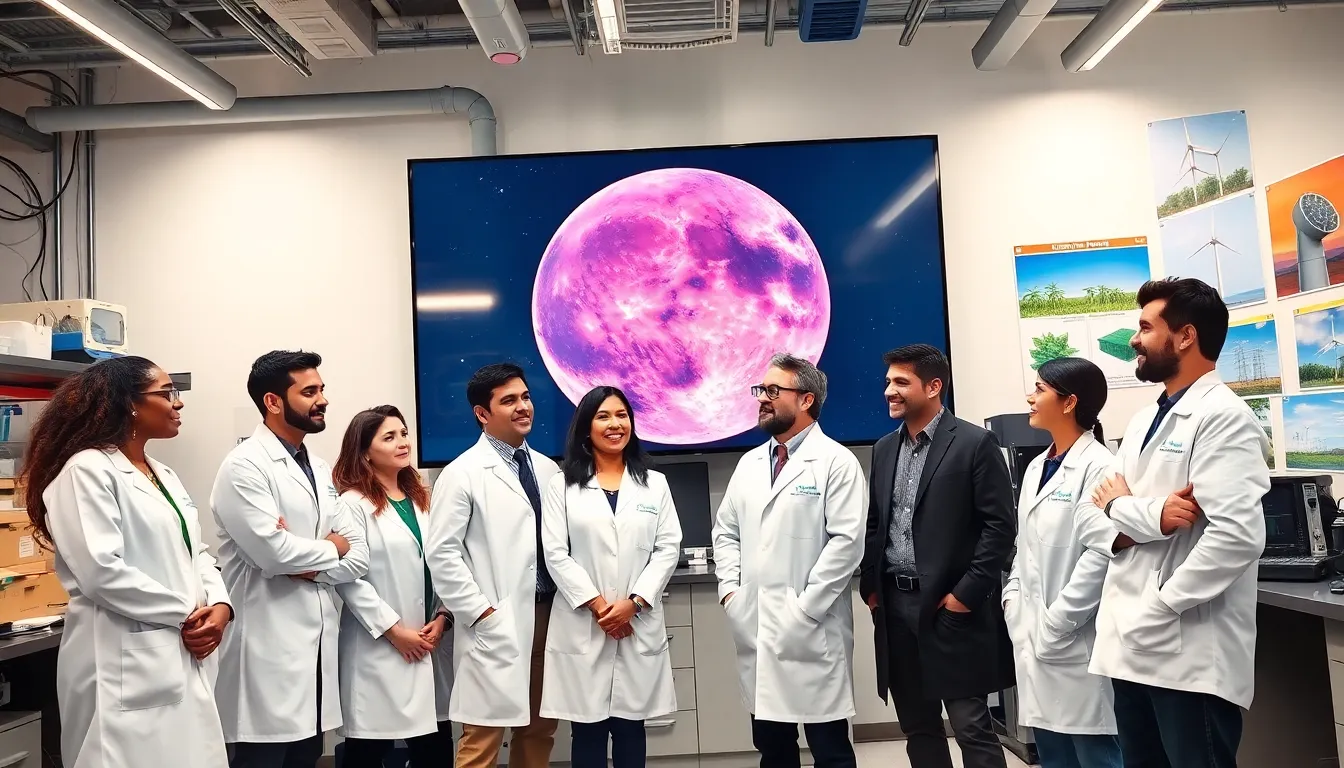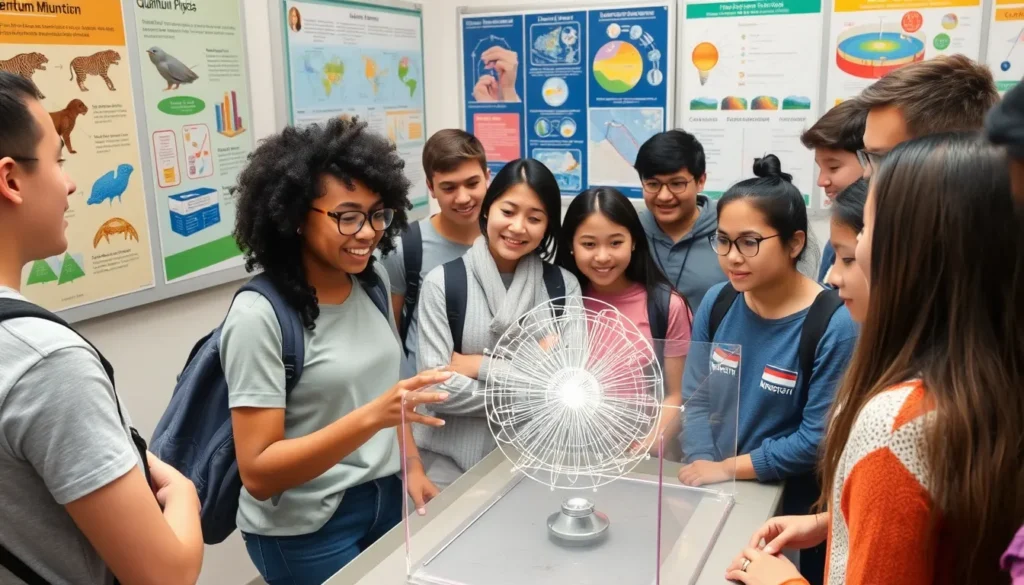Science isn’t just for lab coats and chalkboards; it’s a treasure trove of wonders waiting to be explored. From mind-bending quantum physics to the quirky behavior of animals, there’s a world of cool science topics that’ll make anyone’s brain do a happy dance. Who knew that studying the cosmos could be as thrilling as binge-watching the latest superhero series?
Cool Science Topics
Science offers a diverse range of captivating subjects that can engage everyone. Topics such as quantum physics illustrate the strange behaviors of particles, challenging our understanding of reality. Animal behavior studies reveal intricate social structures and communication methods within various species.
Earth science fascinates with its investigation of natural processes. It explores phenomena like tectonic shifts and climate change effects. Space exploration expands horizons, detailing discoveries about distant planets and celestial bodies.
Biotechnology represents a groundbreaking field, merging biology and technology. Applications include genetic engineering and CRISPR, transforming medicine and agriculture. Neuroscience, focusing on brain functions, uncovers the complexities of human behavior and cognition.
Environmental science addresses critical issues like pollution and conservation. Understanding ecosystems helps preserve biodiversity and combat climate change. Astrobiology, on the other hand, investigates the possibility of life beyond Earth, combining aspects of biology and astronomy.
Robotics captures interest by showcasing advancements in artificial intelligence and automation. This field alters industries, offering innovative solutions to everyday challenges. Additionally, renewable energy science examines sustainable resources, aiming for a cleaner and more efficient future.
Each of these topics not only presents unique insights but also invites deeper exploration. Engaging with them provides a window into the vast universe of scientific discovery.
Trending Science Topics in 2023

Exciting developments in science continue to capture attention in 2023. Notable subjects include space exploration and climate change innovations.
Space Exploration
NASA’s Artemis program aims to return humans to the Moon by 2024. This initiative not only focuses on lunar exploration but also sets sights on Mars for future missions. Advances in reusable rocket technology enhance affordability and sustainability for space travel. Private companies like SpaceX actively contribute to satellite launches and cargo delivery to the International Space Station. Additionally, collaboration with international space agencies fosters innovation in scientific research. Exploring asteroids for resources and studying Mars’ surface conditions open doors to potential extraterrestrial life and resource acquisition.
Climate Change Innovations
Innovations to combat climate change gain momentum in 2023. Researchers develop advanced carbon capture technologies that significantly reduce greenhouse gas emissions. Renewable energy sources, such as solar and wind, become increasingly efficient and cost-effective. Electric vehicles gain popularity, encouraging a shift from fossil fuels to sustainable transport options. Urban areas implement green infrastructure, improving air quality and promoting biodiversity. Additionally, sustainable agricultural practices emerge to minimize environmental impact while maximizing food production. Engaging communities in conservation efforts amplifies awareness and active participation in climate action.
Fascinating Fields of Science
Science encompasses a variety of intriguing areas that engage curiosity and inspire exploration. Quantum physics and neuroscience discoveries stand out as particularly compelling topics with profound implications.
Quantum Physics
Quantum physics explores the striking behaviors of particles at the smallest scales. It reveals phenomena such as superposition, where particles exist in multiple states simultaneously, and entanglement, which connects particles across vast distances. These principles challenge conventional understanding of reality and offer insights into the nature of time and space. Researchers continually discover new quantum technologies, such as quantum computing, which promise to revolutionize problem-solving across diverse fields, including cryptography and artificial intelligence. The excitement surrounding these findings captivates both scientists and enthusiasts alike.
Neuroscience Discoveries
Neuroscience studies the complexities of the brain and nervous system. Recent breakthroughs illuminate how neural pathways influence behavior, memory, and emotions. Advances in brain imaging techniques enable researchers to observe brain activity in real time, fostering a deeper understanding of mental processes. Significant findings suggest connections between neuroplasticity and learning, showing that the brain can adapt and reorganize itself. Companies apply insights from neuroscience to improve mental health treatments and optimize educational methods. This dynamic field rapidly evolves, continually unveiling new mysteries of human cognition and behavior.
The Role of Technology in Science
Technology plays a crucial role in the advancement of scientific fields. Innovations in various areas continue to propel research and discovery.
Artificial Intelligence Advances
Artificial intelligence (AI) has transformed data analysis, enabling scientists to process vast datasets quickly. Machine learning algorithms identify patterns that human researchers might overlook. In healthcare, AI assists in diagnosing diseases by analyzing medical images with greater accuracy than conventional methods. This technology also personalizes treatment plans by predicting patient responses based on genetic information. Development in robotic process automation streamlines laboratory tasks, enhancing research efficiency. As AI continues to evolve, its application in simulations and predictive modeling will revolutionize experimentation across disciplines.
Biotechnology Breakthroughs
Biotechnology merges biology with technology to create innovative solutions for global challenges. Genetic engineering techniques allow for the modification of organisms, enhancing crop resilience against pests and climate change. CRISPR technology enables precise editing of genes, offering potential cures for genetic disorders. Scientists harness microorganisms to produce biofuels, reducing reliance on fossil fuels. Advances in synthetic biology help in developing more effective vaccines and therapies, improving public health. The collaboration between biologists and engineers fosters creativity, driving forward the exploration of new medical treatments and sustainable practices.
Popular Science Communicators
Prominent science communicators engage audiences by making complex topics accessible and entertaining. Neil deGrasse Tyson, a well-known astrophysicist, popularizes astrophysics through books and TV shows, sparking interest in the universe. Bill Nye, renowned as “The Science Guy,” combines humor with scientific education, particularly in classrooms and on public platforms.
Carl Sagan, though no longer living, continues to inspire through his classic series “Cosmos,” which sheds light on the wonders of space and our place within it. Jane Goodall’s work extends beyond animal behavior to encompass conservation efforts, motivating many to connect with nature and protect wildlife.
Consider YouTube as a vital platform for science communication. Channels like Veritasium and SciShow present topics in physics, biology, and chemistry, captivating millions with engaging visuals and clear explanations. With vibrant storytelling, creators like Hank Green offer insights into contemporary science and encourage dialogue about critical issues.
Podcasts also play a significant role. “Radiolab” explores scientific and philosophical questions, engaging listeners with innovative sound design. Each episode delves into diverse topics, sparking curiosity and reflection.
Lastly, social media is potent for reaching wider audiences. Scientists like Christine McKinley and Alice Roberts actively share their research and insights on platforms like Twitter, fostering connections with the public. These popular science communicators collectively shape the understanding of intricate scientific concepts, enhancing public engagement and interest in ongoing discoveries.
Conclusion
Science offers a treasure trove of intriguing topics that spark curiosity and inspire exploration. From the mysteries of quantum physics to the complexities of neuroscience, each field presents opportunities for discovery and understanding.
As advancements continue to unfold in areas like space exploration and climate change, the relevance of these topics grows. Engaging with science not only enhances knowledge but also encourages participation in addressing contemporary challenges.
With passionate communicators bringing these subjects to life, the journey into the world of science remains an exciting adventure for all. Embracing this dynamic landscape can lead to new insights and innovations that shape the future.



